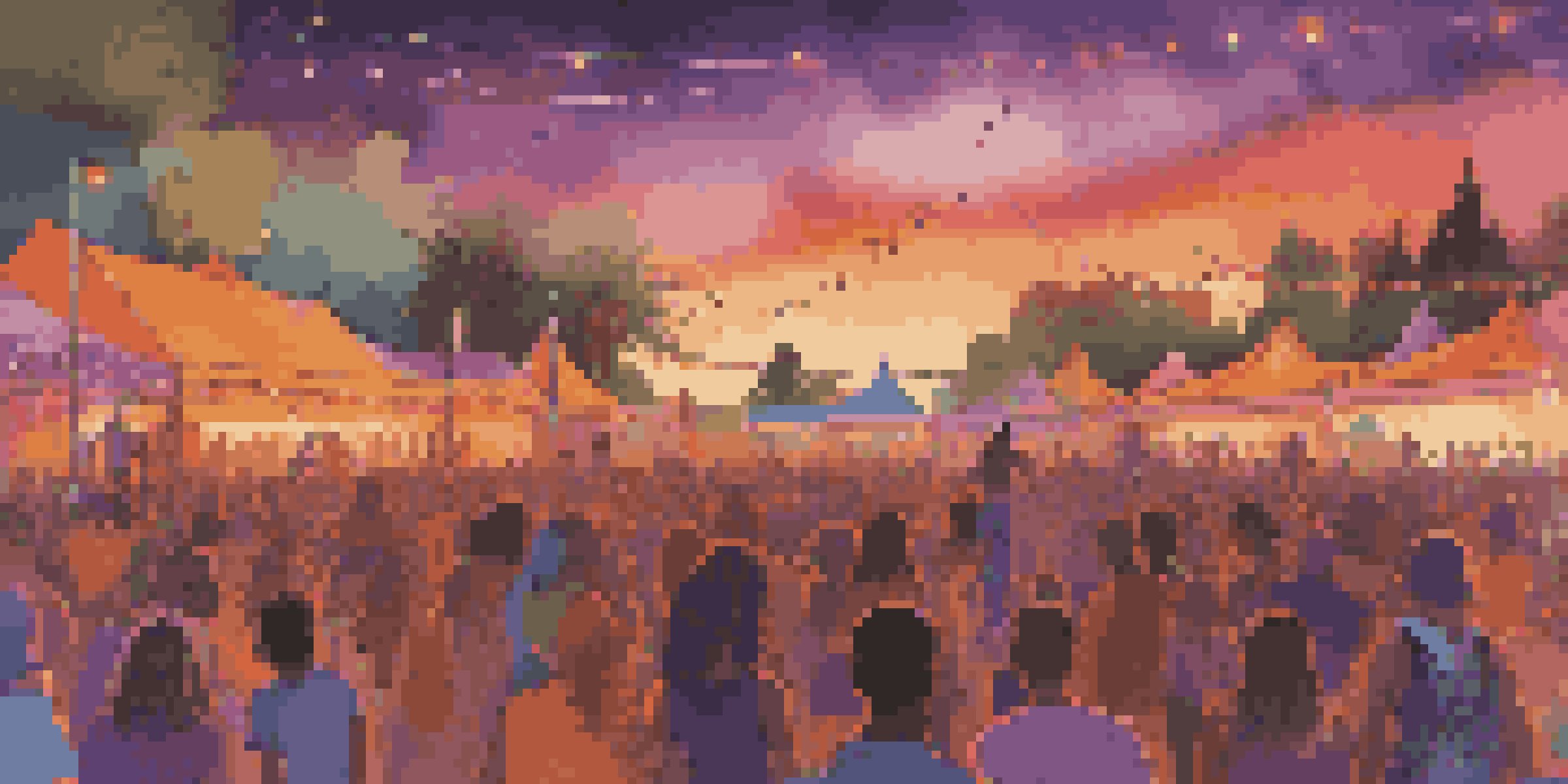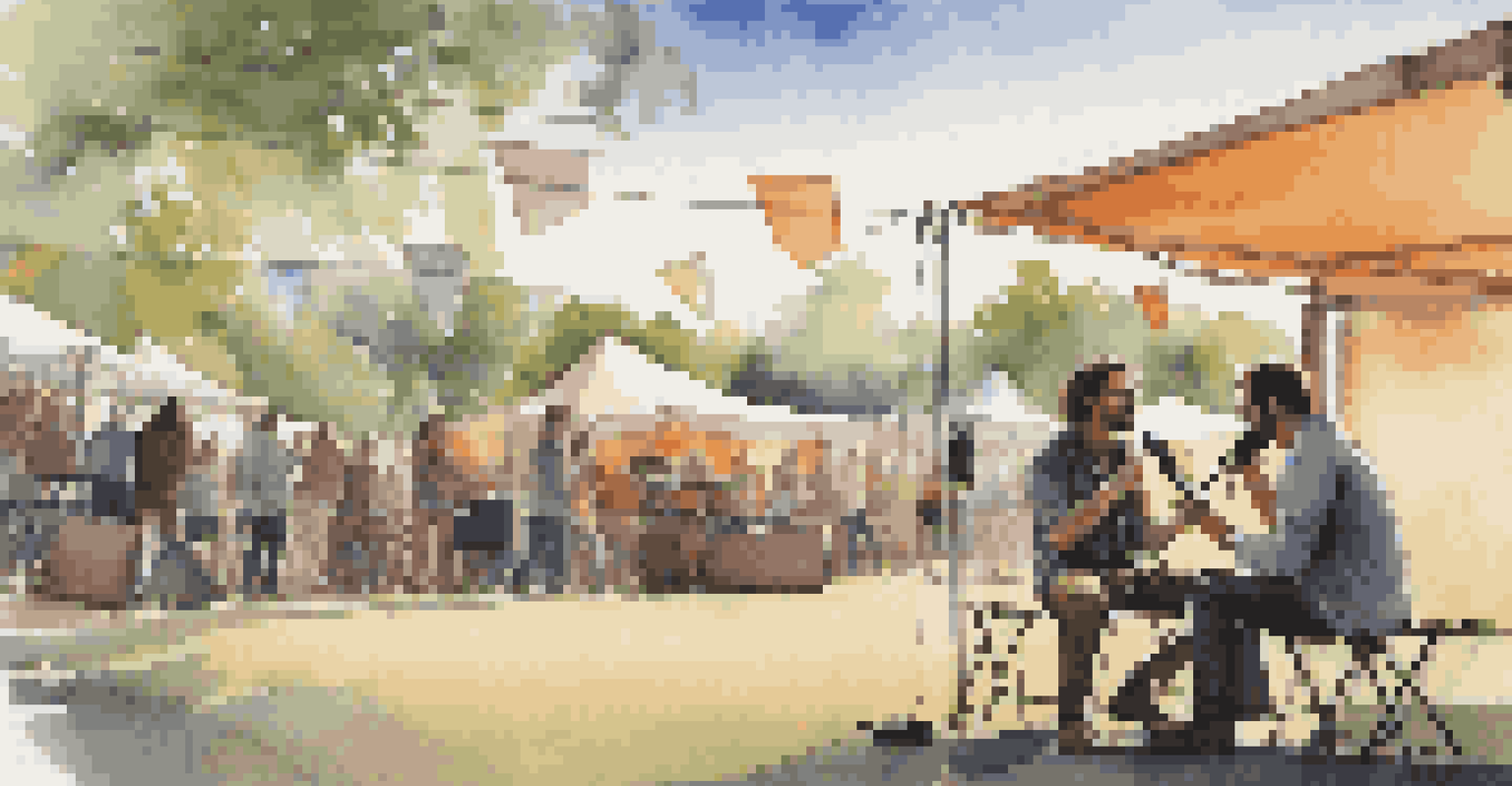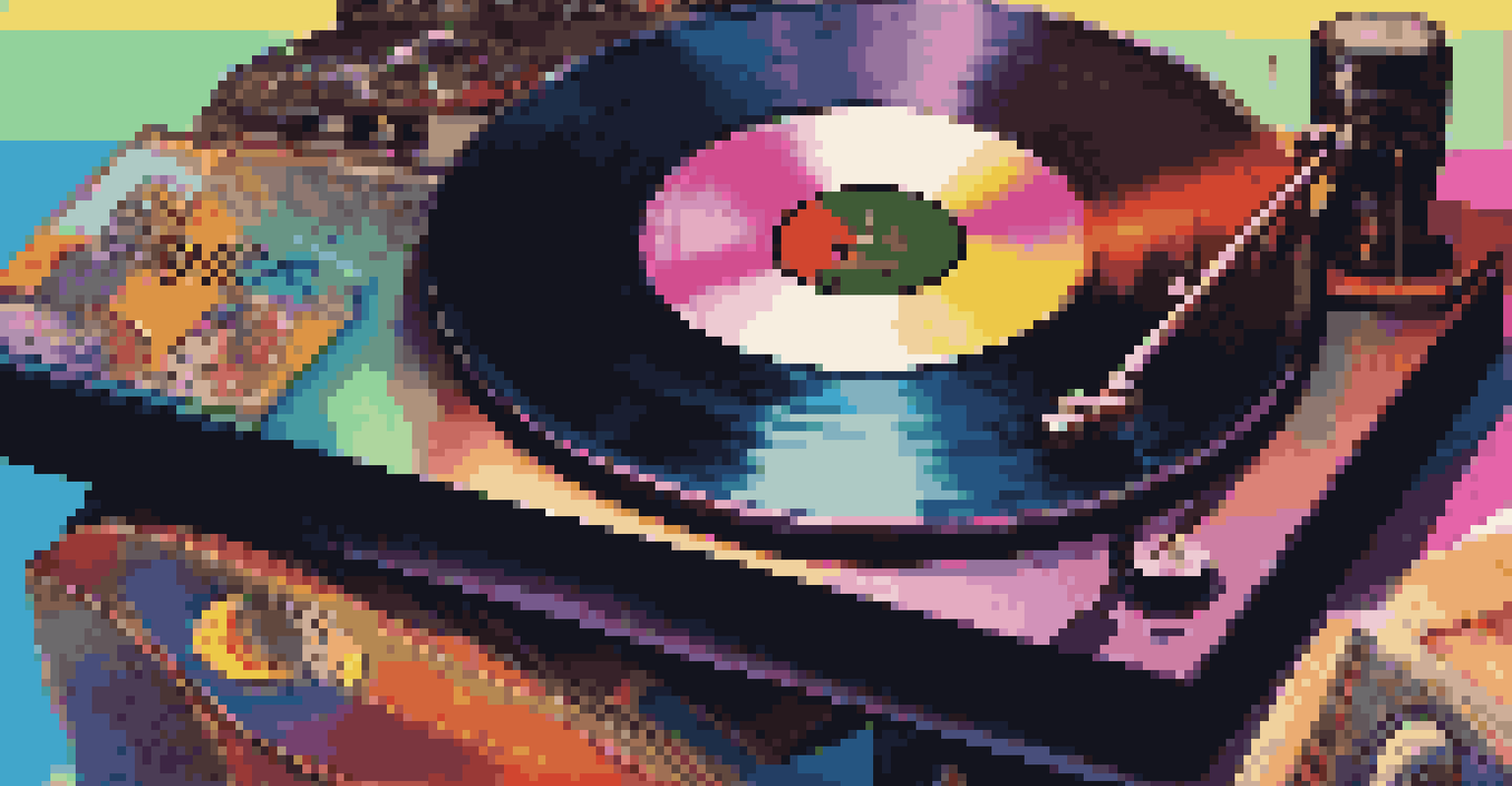The Impact of Music Festivals on Film Soundtrack Trends

Introduction: The Connection Between Music Festivals and Film
Music festivals have become cultural phenomena that influence a wide range of artistic expressions, including film. These events showcase a variety of artists and genres, creating a unique atmosphere that resonates with audiences. By bringing diverse sounds and styles together, festivals can significantly impact the music that filmmakers choose for their soundtracks.
Music can change the world because it can change people.
The relationship between music and film is a long-standing one, with soundtracks often dictating the emotional tone of a movie. As music festivals gain popularity, filmmakers are increasingly drawn to the trends emerging from these gatherings, recognizing the potential to enhance their storytelling. This symbiotic relationship highlights how music festivals can shape the auditory landscape of cinema.
As we dive into the specifics, it’s essential to understand how the energy and variety of music festivals translate into the film industry. From the artists featured to the genres celebrated, each aspect of a festival can create ripples that influence soundtrack choices, making this a fascinating topic to explore.
Music Festivals: A Hotbed for Emerging Artists
One of the most exciting aspects of music festivals is their ability to spotlight emerging artists. Many filmmakers are on the lookout for fresh sounds to set their films apart, and festivals provide a perfect venue to discover new talent. When a song from an up-and-coming artist resonates at a festival, it can lead to significant placements in films.

For example, a lesser-known band might perform at a festival, capturing the attention of a film producer who sees the potential for their track in a specific scene. This not only elevates the artist's career but also enriches the film's soundtrack, creating a win-win situation. Such placements are often celebrated in film credits, giving these emerging artists exposure to wider audiences.
Festivals Spotlight Emerging Talent
Music festivals serve as a launchpad for emerging artists, offering filmmakers fresh sounds that can enhance their film soundtracks.
As a result, music festivals play a crucial role in bridging the gap between independent musicians and the film industry. The increased visibility can lead to collaborations that might not have happened otherwise, showcasing the vibrant exchange of creativity between these two worlds.
Shifting Trends: Genre Influences from Festivals
Music festivals often celebrate specific genres or a mix of them, which can significantly impact film soundtracks. For instance, a surge in electronic music at festivals can lead to its increased use in movie soundtracks, particularly in genres like action or sci-fi. This shift illustrates how the popularity of certain sounds can influence the auditory choices of filmmakers.
Film is a powerful medium that can convey emotions in ways that words alone cannot.
Moreover, festivals can introduce audiences to new hybrid genres, inspiring filmmakers to explore unconventional soundtrack options. As films strive for authenticity, incorporating unique sounds can enhance their narrative and emotional depth. The fusion of genres often seen at festivals encourages filmmakers to think outside the box when selecting music for their projects.
In this way, the evolving landscape of music festivals not only reflects current musical trends but also actively shapes the sounds we hear in films. It’s a powerful reminder of how interconnected the music and film industries truly are.
The Role of Nostalgia in Festival Soundtracks
Nostalgia plays a significant role in both music festivals and film soundtracks. Festivals often celebrate classic hits alongside contemporary acts, creating a bridge between generations of music lovers. This blending of old and new can change the way filmmakers approach their soundtracks, often leading them to include nostalgic tracks that resonate with audiences.
For instance, a film set in the 90s might feature songs that were once festival anthems, appealing to viewers who attended those festivals back in the day. The emotional connection that people have with these songs can enhance their viewing experience, making the film more relatable. As filmmakers embrace this nostalgic element, they often find themselves curating soundtracks that strike a chord with audiences.
Nostalgia Shapes Film Soundtracks
The blending of classic hits with contemporary acts at festivals influences filmmakers to incorporate nostalgic tracks that resonate with audiences.
The inclusion of nostalgic tracks can also serve as a marketing tool, drawing in viewers who have a sentimental attachment to the music. As festivals continue to celebrate iconic songs, filmmakers are likely to follow suit, creating soundtracks that evoke feelings of nostalgia and connect with viewers on a deeper level.
Collaborations: Festivals as Networking Events
Music festivals serve as significant networking events for artists, producers, and filmmakers alike. The casual setting allows for organic conversations and collaborations to blossom, leading to unique partnerships that can redefine soundtracks. For instance, a filmmaker might meet a composer at a festival, leading to a collaboration that blends their artistic visions.
These collaborations can result in innovative soundtracks that push traditional boundaries. The fusion of different perspectives and styles often leads to distinctive musical compositions that enhance a film's narrative. Such partnerships can also bring fresh ideas to the soundtrack landscape, making it more dynamic and interesting.
As festivals continue to grow, their role as fertile ground for these connections cannot be overstated. The opportunities for collaboration often extend beyond just soundtracks, influencing the broader film industry and encouraging cross-pollination of creative ideas.
Audience Engagement: The Power of Live Performances
One of the unique aspects of music festivals is the live performances that create an emotional connection with audiences. This connection can significantly influence how filmmakers choose their soundtracks, as they look to replicate that emotional impact in their films. The energy of a live performance often translates to the screen, enhancing the viewer's experience.
For example, a powerful live rendition of a song at a festival can evoke strong emotions, making it a prime candidate for a film's key scenes. Filmmakers are increasingly aware of how the live performance aspect can enrich their storytelling, leading them to incorporate live recordings from festivals into their soundtracks. This practice not only enhances authenticity but also captures the raw energy of the moment.
Live Performances Enhance Emotion
The emotional connection fostered by live performances at music festivals inspires filmmakers to integrate this energy into their film soundtracks.
As audiences crave more authentic experiences, the integration of live performances into soundtracks is likely to become even more prevalent. This trend emphasizes the importance of music festivals in shaping the way we experience sound in film.
Conclusion: The Future of Soundtracks in Film
As we explore the impact of music festivals on film soundtrack trends, it's clear that this relationship is evolving. With the rise of streaming platforms and the increasing popularity of music festivals, filmmakers have more resources than ever to curate soundtracks that resonate with their audiences. The blending of genres, the emphasis on nostalgia, and the focus on live performances are just a few ways this evolution is manifesting.
Looking ahead, we can expect to see even more collaboration between the music and film industries, fueled by the vibrant energy of festivals. As filmmakers continue to draw inspiration from these events, we may witness a shift in how soundtracks are conceptualized and produced. This interconnectedness will likely lead to a richer auditory experience in cinema.

Ultimately, the impact of music festivals on film soundtracks highlights the importance of creativity and collaboration in both industries. The future promises exciting possibilities as these two worlds continue to influence each other, creating memorable experiences for audiences around the globe.